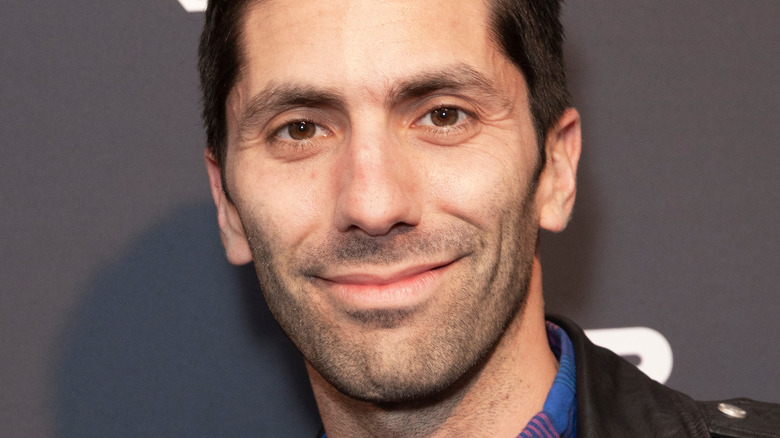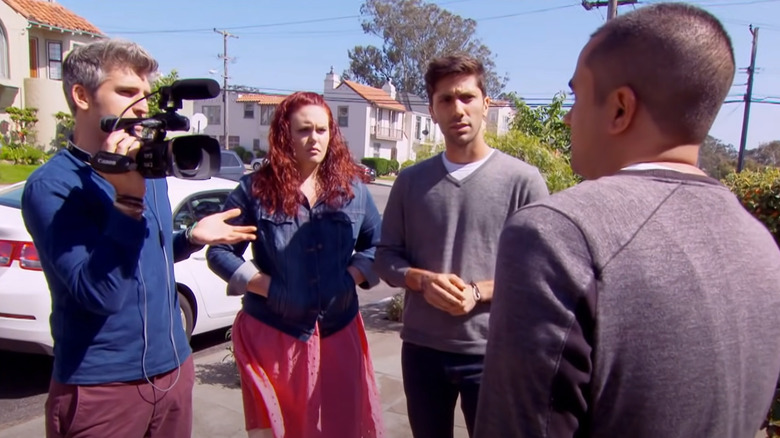Is Catfish: The TV Show Staged?
Though the term "catfishing" has entered the popular vernacular pretty consistently over the last decade (via Urban Dictionary), not everyone can trace it back to its source. The modern usage of the term actually comes from the documentary "Catfish," a movie that explored Nev Schulman's eerie and unsettling experiences with a girl he met online who he realized was deceiving him with false social media profiles and pictures that weren't her own (via Slate).
Though Nev eventually met the lonely old woman who was tricking him, and she turned out to be more or less harmless, that didn't stop "Catfish" from becoming a cautionary tale about trusting words, pictures, and assertions from people you happen to meet online.
Since then, Schulman has gone on to host the MTV series "Catfish: The TV Show." In the series, Schulman and current co-host Kamie Crawford unravel the cases and experiences of others who have been deceived online by fake accounts and the people behind them. Naturally, as with any reality TV show, though, fans of "Catfish: The TV Show" are likely wondering if the show is 100% legit.
Catfish is re-edited and re-framed for dramatic effect
While "Catfish" often frames things as though the person who suspects they're being tricked is the one who applies to be on the show, the truth is that it's actually the scammers and liars themselves who sign up first (via Vulture). Obviously, this makes way more sense as the person on the wrong side of these deals knows what they're doing, whereas the victims are often suspicious at best and oblivious at worst.
MTV's senior vice president of news and documentaries, Marshall Eisen, broke it down like this. "It's often the catfish we hear from first because they're looking to unburden themselves. It's not always the case, but it probably happens more than people realize," he explained.
Furthermore, anyone whose face appears unblurred on the show has signed a waiver, as is the case with other reality TV shows (via The Washington Post). The people at the heart of the story also agree to let "Catfish" producers re-frame the narrative as if the victims had approached MTV rather than the perpetrators, as it adds to the dramatic effect behind the revelations.
Though viewers might feel deceived by these deliberate storytelling conveniences, the entertainment value of "Catfish: The TV Show" would probably be a lot weaker if they didn't handle it this way. In any other scenario, important dialog might be inaudible or camera shots might have to be taken from far off with mere speculation from the hosts.
The hosts are genuinely figuring things out as they go along
However, one thing that's more real than you might think in "Catfish: The TV Show" is how long it takes the hosts to crack the case. Though Nev Schulman's current co-host is Kamie Crawford, it would often take Schulman and his previous co-host, Max Joseph, much longer to sort things out than it might seem on the show.
"We edit the investigations down. They can be grueling," Marshall Eisen told Vulture. "There have been very, very long days where Nev and Max are trying to figure it out, and we can't help them." Again, though there is a layer between the ranks, where the producers know more than the hosts, watching them figure things out is much more entertaining than having it all spilled out at the start.
"The guys are better at it now, but it's not always obvious how to crack these things," Eisen went on. "We've condensed what's taken them ten hours in some instances into five or six minutes, but we try to show that it was difficult." Well, there you have it. While "Catfish: The TV Show" isn't entirely authentic in how it presents the stories behind each episode, enough of it is real that you won't feel like you're being catfished yourself just for watching the show.


